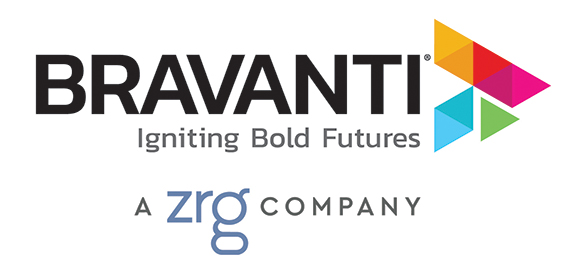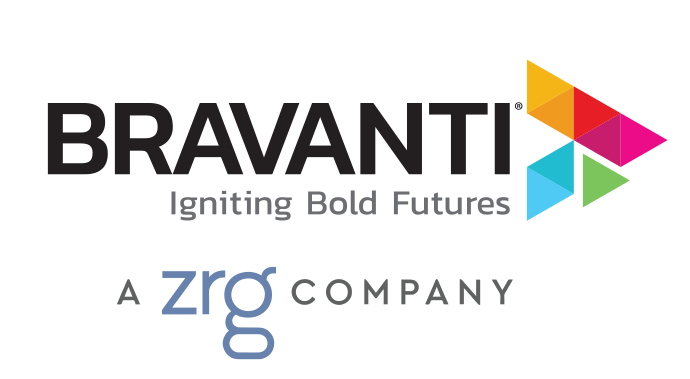Executive coaching is a powerful tool for both individuals and the organizations they lead. As one of the most in-demand professional development tools today, it’s important to understand what it is and how it can transform individuals into high-performing leaders.
In this article, we cover everything from what coaching is, who it’s for, how it helps individuals and organizations, and so much more. Click a link below to jump to a specific section.
- What is Executive Coaching?
- What is an Executive Coach?
- Who is Executive Coaching For?
- Benefits of Executive Coaching
- Types of Executive Coaching
- Executive Coaching Formats
- What Executive Coaching is Not
- What do Executive Coaches Help Clients With?
- Common Executive Coaching Services
- What is a Coaching Culture?
- The Executive Coaching Process
- Considerations for Selecting an Executive Coach
- The Value of Executive Coaching
- Executive Coaching Examples
- Is Executive Coaching For You?
What is Executive Coaching?
 Executive coaching is a professional development tool that consists of one-on-one or group sessions wherein an executive coach uses thought-provoking discussion to guide and support clients through professional challenges and opportunities.
Executive coaching is a professional development tool that consists of one-on-one or group sessions wherein an executive coach uses thought-provoking discussion to guide and support clients through professional challenges and opportunities.
These sessions help clients improve critical thinking and problem solving, strengthen leadership skills, expose blind spots, and change limiting behaviors and beliefs.
Executive Coaching, Leadership Coaching & Business Coaching – What’s the Difference?
Executive coaching is often used interchangeably with leadership coaching and business coaching. While largely similar, there are subtle differences between the three coaching types.
For example, executive coaching and leadership coaching both seek to improve the efficacy of those in leadership positions. However, leadership coaching often focuses more on developing specific leadership skills, such as navigating conflict, developing others, and leading with conviction, whereas executive coaching can include a broader array of topics.
Similarly, while executive coaching focuses on the individual leader, business coaching tends to focus on the business itself. The goal of business coaching is often centered around growth and other success factors of the business rather than the individual.
Additional resources:
- Blog Post | Leadership Coaching: Never More Accessible–or Essential–than Now
- Podcast | Build Better Leaders with Executive Coaching
- Video Series | Journeys in Leadership
What is an Executive Coach?
An executive coach is a trained professional who works with leaders and teams to identify and overcome obstacles to success while helping them develop leadership skills and abilities.
Executive coaches often come from diverse backgrounds and can include former business leaders, academics, medical professionals, industry thought leaders and more. Top executive coaches often have certifications from one of three primary certifying bodies in the executive coaching industry:
- The International Coaching Federation (ICF)
- The Center for Credentialing & Education (CCE)
- The International Association for Coaching (IAC)
Additional resources:
Who is Executive Coaching For?
Historically, executive coaching was reserved for those at the top of the org chart but today, businesses around the world are actively using this tool to develop professionals at different levels in business, including first-time leaders and high potentials.
Here are the most common groups who benefit from executive coaching:
CEO & C-suite Executive Coaching
The most common application of executive coaching is for CEOs, COOs, CTOs, and other key members of the C-suite. Individuals in these roles are responsible for the entire organization and workforce, and therefore leadership efficacy is tantamount to success. Executive coaching for CEOs and other C-suite members often focuses on strategy, vision, change management, and other top-level initiatives.
Senior Leader Executive Coaching
Those in upper management, such as regional leaders, vice presidents, senior directors, and others, are great candidates for executive coaching. These individuals are next in line for top leadership positions and executive coaching helps to prepare them for the heightened responsibilities. Executive coaching for senior leaders often focuses on communication, executive presence, navigating conflicts, and similar initiatives.
New Leader Executive Coaching
When a leader joins a new organization in a top role, how that leader is onboarded is critical to their success. From navigating the responsibilities of the new role and developing relationships with relevant stakeholders, to learning the subtle nuances of company culture, it must be approached with care and urgency. Executive coaching for new leader acceleration helps to ease this transition by focusing on team dynamics, stakeholder feedback, prioritization, communication, and more.
First-Time Leader Executive Coaching
First-time people leaders are often promoted based on their abilities as individual contributors, but as they move into management roles, they must be prepared to shift from a mindset of tactical execution to strategic leadership. This isn’t an easy shift to make, and executive coaching helps these individuals by focusing on leading others, effective communication, professional presence, navigating conflict, leading with empathy, and more.
Of the groups outlined in this section, executive coaching for first-time leaders may have the greatest organizational impact over time. By offering executive coaching to first-time leaders, organizations can strengthen their leadership bench while improving performance at the executional level, where strategic direction meets reality.
High-Potential Executive Coaching
Like new leaders, individuals identified as high-potentials for leadership positions benefit greatly from executive coaching for leadership development. High potentials often excel in their respective field or function, leading to recognition for future leadership roles. This helps to improve the organization’s leadership bench and requires diligent preparation of these individuals for the increased responsibilities and mindset shift from contributor to leader. Executive coaching helps to develop high-potential leaders by focusing on mindset, leading others, navigating conflict, effective communication, and other key leadership skills.
Underrepresented Groups Executive Coaching
As organizations uplift and empower individuals from underrepresented groups, such as women leaders, BIPOC, and the LGBTQ+ community, executive coaching can be a key resource in furthering this effort. Underrepresented groups often lack the resources, opportunity, and exposure that other groups benefit from, and they have unique sets of challenges that others don’t, leading to fewer professional development opportunities. Executive coaching helps to close the gap and address the unique challenges of these groups.
Executive Coaching in Different Industries
The value of executive coaching can be applied to virtually any industry. At Bravanti, we’ve worked with leaders from a wide range of industries, including healthcare, financial services, consumer product goods, hospitality, and energy, as well as functions, such as operations, finance, sales, marketing, customer support, and more. The primary criterion for determining whether executive coaching is right for your industry or function is to simply ask, “Is there a need for effective leadership?”
Additional Resources:
- Podcast | Build Better Leaders with Executive Coaching
- Article | Don’t Forget Your Team: One Global CEO’s Journey to Executive Team Excellence
- Article | Building Better Global Leadership Teams
Benefits of Executive Coaching
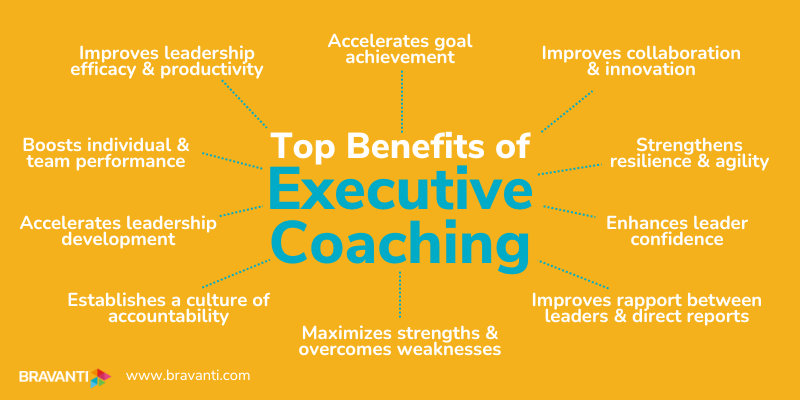
Countless studies have shown the indisputable benefits that executive coaching offers. While the benefits received will greatly depend on your specific initiatives, here is a list of the most common benefits of executive coaching:
- Improves leadership efficacy
- Boosts individual and team performance
- Accelerates goal achievement
- Improves collaboration and innovation
- Heightens individual self-awareness
- Improves empathy
- Strengthens individual and team resilience in times of change
- Improves leaders’ ability to develop others
- Reveals and challenges limiting beliefs and behavior patterns
- Increases employee motivation, engagement, and retention
- Improves productivity
- Accelerates leadership development
- Establishes a culture of accountability
- Maximizes strengths and overcomes weaknesses
- Enhances leader confidence
- Improves rapport between leaders and direct reports
- Helps leaders to identify and minimize burnout in themselves and their teams
Additional Resources:
- Video Series | Conquering Change
- Blog Post | Leadership Coaching: Never More Accessible–or Essential–than Now
- LinkedIn Carousel | How to Integrate Coaching into Your Leadership Style
Types of Executive Coaching
 There are several different types of executive coaching to choose from, and it’s common for coaching engagements to utilize a combination of these different types to reach the client’s stated goals.
There are several different types of executive coaching to choose from, and it’s common for coaching engagements to utilize a combination of these different types to reach the client’s stated goals.
Individual Coaching
This is the most common form of executive coaching. It involves a one-on-one partnership between the executive coach and the client with the goal of addressing individual strengths and weaknesses.
Team or Group Coaching
Team or group coaching is a fast-growing type of executive coaching. It involves the coaching of two or more individuals, usually from the same team or cohort, with the intention of working toward shared goals.
Peer Coaching
Peer coaching is a mutually beneficial relationship between colleagues wherein individuals support one another by sharing feedback, insights, and best practices. Peer coaching doesn’t require any one individual to be an executive coach and is often a byproduct of creating a coaching culture that instills the principles of coaching into employees.
Additional Resources:
- Blog Post | How Global Teams Overcome Obstacles for Optimal Results
- Case Study | Power Among Peers: A Unique Coaching Success Story
- Video Series | Journeys in Leadership
Executive Coaching Formats
 Executive coaching can be accomplished in-person or virtually. Each format offers different benefits, and the better choice is dependent upon your unique needs. Your executive coaching engagement may employ only one of these formats or a combination.
Executive coaching can be accomplished in-person or virtually. Each format offers different benefits, and the better choice is dependent upon your unique needs. Your executive coaching engagement may employ only one of these formats or a combination.
In-Person Coaching
The traditional format for executive coaching sessions is in-person. This format is often preferred as it allows for direct connection with the executive coach. The pandemic made in-person coaching impossible but as restrictions lift around the globe, many are returning to this preferred format.
Pros of In-Person Executive Coaching
- Can create a stronger connection between coach and coachee
- Ability to perceive all forms of communication easily, including non-verbal
- In-person sessions may heighten focus and commitment
Cons of In-Person Executive Coaching
- May limit frequency or duration of meetings
- Potential higher costs for travel expenses
- For team coaching, geographically dispersed team members not able to join in-person
Virtual Coaching
With the rise of video conferencing over the past few years and the final push from the pandemic, virtual coaching has become the most common format of executive coaching. Also called online coaching, distance coaching, or remote coaching, virtual coaching has its own pros and cons, though experts believe this format will continue to grow in popularity with the introduction of new and better tools.
Pros of Virtual Executive Coaching
- Better for flexible scheduling and time management
- Easier for geographically dispersed team members to join
- Ability to record sessions easily for future reference
- Affordability due to lack of travel expenses and less time out of office
Cons of Virtual Executive Coaching
- Decreased ability to sense non-verbal communications
- Potential for technical issues to disrupt sessions
- Potential for distractions with incoming emails, messages, etc.
Additional Resources:
What Executive Coaching is Not
There are some common misconceptions around what coaching is and how it relates to other types of one-on-one support. We examine the most common of these comparisons in this section.
Coaching vs. Mentoring
The primary difference between coaching and mentoring is that mentors provide advice, counsel, and resources directly to the client while coaches provide knowledge frameworks that deepen the client’s learnings and tap into the coachee’s own potential for sustained behavior change.
Coaching vs. Consulting
While coaching supports clients by guiding them through critical thinking to improve their ability to problem-solve independently, consulting provides knowledge, resources, and tools to solve the client’s problem directly. This often results in a one-off resolution rather than sustainable change.
Coaching vs. Therapy
Therapy is quite different from coaching in that it is a profession geared to treating mental health, often focusing on the past and present, while coaching is not a treatment and is usually present- and future-oriented. Another primary difference is that therapists are licensed professionals in a highly regulated industry while coaching is considerably less regulated, and certification is not required.
Performance Coaching vs. Remedial Coaching
Historically, executive coaching was thought of as a last resort to address poor behaviors and cognitions in a leader. However, this approach is often unsuccessful as the coaching engagement is forced upon the individual without their own desire to change. Individual commitment to the coaching process is a must as personal growth can be uncomfortable and challenging. Without this commitment, any change or growth that occurs is likely to be temporary at best.
What Do Executive Coaches Help Clients With?
The power of executive coaching is that it is completely customized to the individual or organization’s unique needs.
Strategy & Vision
If you’re an executive leader, building and communicating a long-term organizational strategy and vision is one of your biggest responsibilities. Executive coaching can support leaders through the process of strategic planning and direction-setting, as well as developing a communication strategy that garners buy-in and aligns stakeholders.
Additional Resources:
- Podcast | Culture, Vision, & Communication with Rob Brown, Managing Director & CEO North America at Lincoln International
- Blog Post | Aligned and Defined: Winning in 2022 with an HR-Driven Business Strategy
Culture Alignment
Leadership sets the tone for workplace culture and is the first place to focus when working to improve organizational culture. Culture alignment coaching is a powerful tool that helps leaders to understand how their behaviors lead the way for the entire organization and proven methodologies for transforming leaders into living examples of core principles and organizational values.
Additional Resources:
- Podcast | Aligning Leaders, Teams, and Culture with David Petratis, CEO, Allegion
- Case Study | Transforming Organization and Culture through Coaching
Team Coaching
Team cohesiveness and efficacy are key to performance, whether this is the executive team, a specialized group, or a larger cohort of individuals. Team coaching can transform how these teams function, aligning and engaging team members around a shared vision and objectives to deliver powerful business results.
Additional Resources:
- Article | Building Better Global Leadership Teams
- Case Study | Culture Transformation for Leaders & Teams
Leadership Development
There are no perfect leaders and as individuals, especially those in high-profile leadership roles, the need for ongoing personal and professional development is tantamount to individual and organizational success. In this sense, the role of executive coaching in leadership development cannot be overstated.
Additional Resources:
- Blog Post | Coaching’s Role in Leadership Development Programs
- Infographic | One Company’s Next-Gen Leaders and How They Arrived
Change Management
Organizations around the world are struggling to thrive in today’s accelerating rate of change. Change management coaching is a powerful tool to help organizations meet the demands of ongoing change with nimble, engaging, and proactive leaders who possess the competencies and skills to lead through change.
Additional Resources:
- Video Series | Conquering Change
- Blog Post | Words Matter: The Leader’s Guide to Communicating Change
- Checklist | The Leader’s Quick Guide to Communicating Change
New Leader Acceleration
Understanding the issues and concerns of a new team is one of the biggest challenges faced by newly hired leaders. New leader acceleration helps to speed up the onboarding process, provides a forum for the team to learn the leader’s management style and vision for the future, and initiates an open dialogue between the leader and team.
Additional Resources:
- Blog Post | The Value of Key Stakeholder Feedback
- Case Study | New Leader Onboarding and Acceleration for a New Spin-Off
Leading Global Teams
In an increasingly globalized world, the need for individuals who can effectively lead globally dispersed teams has never been higher. Executive coaching equips executives with the skills and abilities to lead global teams by developing executives’ cultural awareness, leadership flexibility, and influencing skills required to lead global and matrixed organizations.
Additional Resources:
- Blog Post | How Global Teams Overcome Obstacles for Optimal Results
- Case Study | Aligning, Centralizing, & Standardizing Coaching Across Europe
Executive Presence & Presentation
Executive presence and presentation are intangible qualities that can greatly impact how a leader is perceived within their organization and beyond. Executive coaching helps leaders to develop and project an image that conveys authenticity and credibility to colleagues, teams, and boards in a way that fuels success.
Additional Resources:
- Podcast | Trust & Leadership with Angela Deputy, Vice President of Field Operations Human Resources at Aspen Dental
- Case Study | Coaching for a Global Women’s Leadership Conference
Succession Planning
While most executive coaching focuses on the skills and abilities of current leaders, succession planning is a crucial element of business continuity that executive coaching can support. Executive coaches work with current leaders (and sometimes partner with search firms) to identify high-potential successors for key leadership positions, and establish development plans to help guide their success.
Additional Resources:
- Article | Succession Planning: Fully Developing the Talent Pipeline
- Case Study | High-Potential Leadership Program for Succession Management
Mergers, Acquisitions, and Spinoffs
Executive coaching is the go-to tool for equipping leaders for the challenges of major organizational changes such as mergers and acquisitions (M&A), spinoffs, workforce restructuring, technology transformations, and more.
Additional Resources:
- Blog Post | Increase the Odds of M&A Success with a Smart Talent Strategy
- Case Study | Positioning a Major Spinoff for Success
Common Executive Coaching Services
In addition to coaching, there are a number of other services that executive coaches also provide to their coaching clients.
- Assessments: Assessments are used as a key tool to establish benchmarks, guide discovery, and focus development plans on an individual’s specific development needs.
- Stakeholder Feedback: Interviews with key stakeholders help leaders to understand how others view their leadership while helping them to identify ways to capitalize on strengths and develop areas that are holding them back.
- Competency Modeling: Executive coaches can work with an organization’s human resources department to develop competency models. These models outline the specific skills, knowledge, and behaviors required for a particular role.
Additional Resources:
- Blog Post | Coaching: Going Beyond Feedback
- Article | The Value of Key Stakeholder Feedback for CEOs
- Case Study | Designing Cross-Functional Leadership Competencies
What is a Coaching Culture?
 A coaching culture is an environment where an organization leverages the core principles and practices of coaching across its workforce. Accredited coaches help to establish norms, behaviors, and mindsets that align with the principles of coaching while training leaders to also coach their own teams for higher-impact results.
A coaching culture is an environment where an organization leverages the core principles and practices of coaching across its workforce. Accredited coaches help to establish norms, behaviors, and mindsets that align with the principles of coaching while training leaders to also coach their own teams for higher-impact results.
Benefits of Creating a Coaching Culture:
- Accelerates individual learning
- Improves efficacy of leaders and teams
- Creates a natural environment for leadership development
- Improves agility in times of change
- Increases employee engagement, satisfaction, and retention
- Improves collaboration, creativity, and innovation
- Drives transparency and accountability
Additional Resources:
- Blog Post | How a Coaching Culture Can Transform Your Organization
- Case Study | A Culture Transformation for Leaders & Teams
The Executive Coaching Process
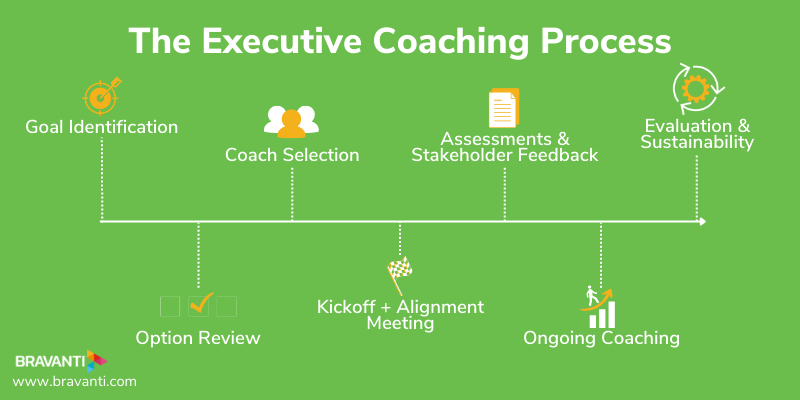
While processes vary based on type, format, and coach, there is a general approach to starting an executive coaching process, for both the individual and the organization.
Executive Coaching Process for Individuals
This is the typical process for individuals engaging an executive coach:
- Identify Your Goals: Prior to seeking out an executive coach, it’s important to determine your specific goals for the engagement. What are you struggling with? What does success look like?
- Review Your Engagement Options: There are generally two ways to engage an executive coach: individually on your own or through your employer. Many companies offer executive coaching as a component of leadership development initiatives, so discuss with your employer if this is an option. However, you may prefer to engage a coach on your own.
- Select an Executive Coach: Choosing your executive coach is one of the most important steps in the process and finding a good fit is a process in and of itself that requires careful consideration. We’ve outlined the steps for doing this in the next section, “Selecting an Executive Coach.”
- Alignment Meeting: You’ll kick off your executive coaching engagement with an alignment meeting with your coach. This meeting is an opportunity for you and your coach to establish a shared understanding of your goals and what success looks like to you. Your coach will work with you to identify specific KPIs related to your goals in order to establish a benchmark for tracking progress. Lastly, your executive coach will use this meeting to provide you with an overview of the coaching engagement, outline next steps, confirm your communication cadence between sessions, and answer any additional questions you may have.
- Assessments & Stakeholder Interviews: Top executive coaches utilize assessments and stakeholder interviews to increase your self-awareness, establish benchmarks, and garner candid feedback about you from relevant stakeholders. Your coach will then use the findings from these assessments and interviews to craft your custom development plan.
- Ongoing Coaching: Throughout the course of your coaching engagement, your executive coach will work with you toward your stated goals. You will begin to practice new behaviors that align with your goals and work with your coach to troubleshoot obstacles that occur during this time. Your executive coach will guide you through exercises for problem-solving, self-reflection, and more.
- Evaluation & Sustainability: At the end of the executive coaching engagement, your coach will meet with you to measure progress outcomes against your stated objectives. They will also work with you to develop a plan for sustaining the newly learned skills, behaviors, and concepts for continued success.
Executive Coaching Process for Organizations
This is the typical process for organizations seeking executive coaching providers for their employees.
- Get Stakeholders on Board: Whether the need for coaching is specific to a single leader or a group, the first step in the executive coaching process is getting all stakeholders on board. Discuss the parameters of the coaching engagement, who will be coached, and how this will be managed internally.
- Identify Your Goals: Work with your stakeholders to identify specific goals of the coaching engagement. What are the primary needs of the coachee(s) and the organization? What does success look like?
- Define Your Requirements: Clearly define your requirements for the coaching engagement to aid and accelerate the provider search process. This will help to narrow your scope and ensure a good fit with the right coach or coaching firm.
- Select a Partner: Whether selecting a single coach for one individual or a coaching firm with global capabilities, the search for the right executive coaching partner can be difficult. We’ve outlined questions and considerations in the next section, “Selecting an Executive Coach.”
- Alignment Meeting: You’ll kick off your executive coaching engagement with an alignment meeting with your selected coaching partner. During this session, you and any relevant stakeholders will meet with the coach or the lead coach (if working with a firm) to establish a shared understanding of your goals and what success looks like to your organization. Your partner will work with you to identify specific KPIs related to your goals in order to establish a benchmark for tracking progress. During this meeting, be sure to discuss timelines, how individual coaching engagements will be arranged, and a standard communication cadence between sessions for all participants.
- Assessments & Stakeholder Interviews: The next step in the executive coaching process is for the coach(es) to perform participant assessments and stakeholder interviews. These will help to bolster self-awareness for each participant while establishing benchmarks for progress tracking. The coach(es) will then use the findings from these assessments and interviews to craft custom development plans for each of the coachees.
- Ongoing Coaching & Progress Tracking: During the coaching engagement, your coaching partner will track and report progress updates to you. They will keep you abreast of relevant findings and happenings while maintaining the confidence of participants.
- Evaluation & Sustainability: Once the coaching engagement ends, your coaching partner will meet with you to measure progress outcomes against your stated objectives. They will also provide an action plan for sustaining the achieved results for continued success.
Additional Resources:
- LinkedIn Carousel | Optimize Your Coaching Experience
- Video | Journeys in Leadership, Episode 12 – Getting the Most Out of Coaching with Sandra Ramos
Considerations for Selecting an Executive Coach
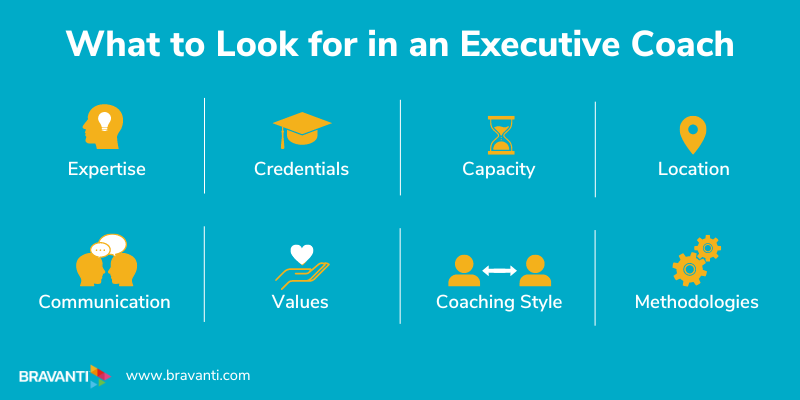
Finding the right executive coach is tantamount to success. Here are some considerations to help you in your search.
- Expertise: If your role or leadership level requires a specific set of skills or experience, this should be a guiding criterion for your search. For example, for CEOs seeking guidance and support during a merger, the chosen executive coach should have experience in this area (either directly or by coaching others in a similar role). Expertise can relate to specialties (as in the case of a merger), industries, roles/functions, and skills (e.g., strategic vision, change leadership, high-growth management, etc.).
- Credentials: While certification isn’t required for executive coaches, top prospects will have credentials from one of the industry’s certifying bodies (listed earlier in this post). Choosing a coach with credentials is a great way to ensure that they are qualified.
- Location: If you prefer to meet face-to-face rather than virtually, your coach’s proximity to you and ease of access are important factors. State this upfront so prospective coaches are aware.
- Coaching Style: As with any partnership, it’s important that the coaching style aligns with your personal communication style. Consider whether you prefer a more direct, “tough love” coaching style or a softer, empathetic style. Topics discussed during coaching sessions will touch on sensitive topics so it’s important to know how you want to be guided through these discussions.
- Methodologies: Executive coaches often use mental models during their coaching engagements. These may be proprietary to the coach or developed by a third party. Ask prospective coaches what methodologies they use and how those methodologies will help your particular needs.
- Communications: Depending upon your unique needs, you may need more intensive support during your executive coaching agreement. Consider how much time a coach can devote to you, what the frequency of sessions are, and terms for communication in between sessions.
- Values Alignment: It’s imperative that you select a coach whose values and priorities align with yours. Whether you’re looking for a heart-driven coaching experience or want to focus on business results and growth, find someone who mirrors those priorities in their own coaching acumen.
Additional questions for employers to ask:
- Capacity: Does the coaching provider have the capacity to serve large groups? Can they serve globally dispersed teams?
- Past Work: Has the coaching provider worked with organizations like yours in the past? Have they delivered engagements similar to the one you need?
- Coach Credentials: What credentials do the coaching provider’s executive coaches hold?
- Matching Process: What is the coaching providers process of pairing participants with a coach?
Additional Resources:
- Blog Post | Coaching: Going Beyond Feedback
- Information Page | Bravanti’s Executive Coach Credentials
The Value of Executive Coaching
With the increased demand for executive coaching services over the last few decades, a growing body of research has sought—and found—a consistent, direct correlation between executive coaching and business success.
These studies show that executive coaching is a powerful tool with both tangible and intangible results that can transform leadership and their organizations.
Key Statistics in Executive Coaching ROI
- 77% of coaching clients indicate that coaching had a significant impact on at least one of nine business measures (MetrixGlobal)
- 256% ROI reported by companies who invest in developing soft skills such as agility and resilience (International Growth Centre)
- 65% lower employee turnover as a result of coaching (Workplace Wellness Trends)
- 21% higher productivity as a result of coaching (Accenture, 2019).
- 91% of coachees increased their self-reflection, awareness and sense of purpose (CoachHub)
- 96% of those who have had an Executive Coach said they would repeat the process again (International Coaching Federation)
Bravanti also conducted its own proprietary research earlier this year, producing the research report Executive Coaching – Impact & Return which demonstrates high return on investment, increased leadership efficacy, and sustainable change among users of executive coaching.
Additional Resources:
- White Paper | The ROI of Exceptional Leadership
- Infographic | What is Coaching Worth? One Company’s Next-Gen Leaders and How They Arrived
- Case Study | Healthy Leadership, Healthy Team, Healthy ROI
Executive Coaching Examples
Executive coaching can be applied to a wide range of common scenarios in business. Here is a sampling of scenarios where executive coaching can solve an individual or organization’s challenges.
- To prepare key talent for future expanded leadership roles and responsibilities
- To understand and maximize organizational internal processes for improved leadership outcomes
- As a means of enhancing the leadership capability of a high performer
- To speed up the transition of an individual moving into a significantly different role, or fast-track the integration of an individual into the organization
- As a strategic investment in an individual who is in a highly critical role
- To develop current and future performance outcomes for leaders and their organizations
- To optimize team performance
- To build senior executive strategy muscle
- To empower executives with a personal brand of influential presence
and communication skills
Is Executive Coaching for You?
The next step in understanding executive coaching is determining whether it’s the right tool for you and your organization. We are standing by to answer any questions you may have about executive coaching and how it can benefit you. Schedule a call with us to learn more.
